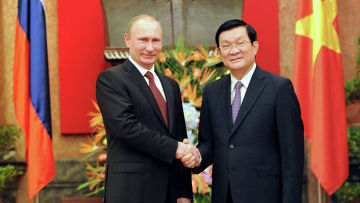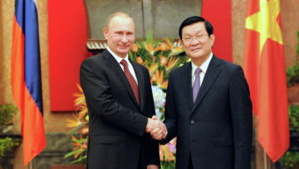The prime minister of the Russian Federation Dmitry Medvedev and the head of the government of Vietnam Nguyen Tan Dung also signed two additional protocols and the second agreement between the Russian Federation and Vietnam on granting a most favored nation treatment by the Vietnamese party to the Russian service providers and investors.
- We want to thank personally you, and also the government of Russia and the government of other member countries of the Euroasian Economic Union for your support, close interaction with us which allowed us during very short time – only two years - to complete negotiations and come to conclusion of agreement about creation of a free trade zone, - declared the prime minister Nguyen Tan Dung in a conversation with Medvedev.
This first agreement of this sort with foreign countries for all participating countries of EAEU was noted by the minister of trade of the Euroasian Economic Commission (EEC) Andrey Slepnev.
- It shows that we move in a trend of processes in world trade. If all initiatives which we have for the world today are realized, all the world trade will be carried out within a free trade regime to 60% - and some experts believe, what even to 80%, against 25% now, just in five-six years, - noted Slepnev. - Thus, the WTO becomes a necessary, but insufficient condition - the most part of all world trade will go in a free trade regime. It is an absolutely new call. We have been joining WTO 18 years, but now we understand that our export ambitions can be realized only in case we have the concept of new model of international trade.
Armenia, Belarus, Kazakhstan and the Russian Federation are a part of the Euroasian Economic Union.
The agreement provided conditions of charge trade liberalization of goods between member states of EAES and Vietnam by decrease or zeroing the rates of the import customs duties on the majority of the commodity positions included in product ranges of participants of the agreement.
Thus, the parties of the agreement will keep the protection on a number of the most sensitive commodity positions.
Also the agreement provided additional rules of sanitary and phytosanitary regulation, technical regulation, customs administration, application of protective measures, criteria of definition of sufficient processing / processing of goods, transparencies, the competition, electronic technologies in trade.
source: reuters.com
- We want to thank personally you, and also the government of Russia and the government of other member countries of the Euroasian Economic Union for your support, close interaction with us which allowed us during very short time – only two years - to complete negotiations and come to conclusion of agreement about creation of a free trade zone, - declared the prime minister Nguyen Tan Dung in a conversation with Medvedev.
This first agreement of this sort with foreign countries for all participating countries of EAEU was noted by the minister of trade of the Euroasian Economic Commission (EEC) Andrey Slepnev.
- It shows that we move in a trend of processes in world trade. If all initiatives which we have for the world today are realized, all the world trade will be carried out within a free trade regime to 60% - and some experts believe, what even to 80%, against 25% now, just in five-six years, - noted Slepnev. - Thus, the WTO becomes a necessary, but insufficient condition - the most part of all world trade will go in a free trade regime. It is an absolutely new call. We have been joining WTO 18 years, but now we understand that our export ambitions can be realized only in case we have the concept of new model of international trade.
Armenia, Belarus, Kazakhstan and the Russian Federation are a part of the Euroasian Economic Union.
The agreement provided conditions of charge trade liberalization of goods between member states of EAES and Vietnam by decrease or zeroing the rates of the import customs duties on the majority of the commodity positions included in product ranges of participants of the agreement.
Thus, the parties of the agreement will keep the protection on a number of the most sensitive commodity positions.
Also the agreement provided additional rules of sanitary and phytosanitary regulation, technical regulation, customs administration, application of protective measures, criteria of definition of sufficient processing / processing of goods, transparencies, the competition, electronic technologies in trade.
source: reuters.com






